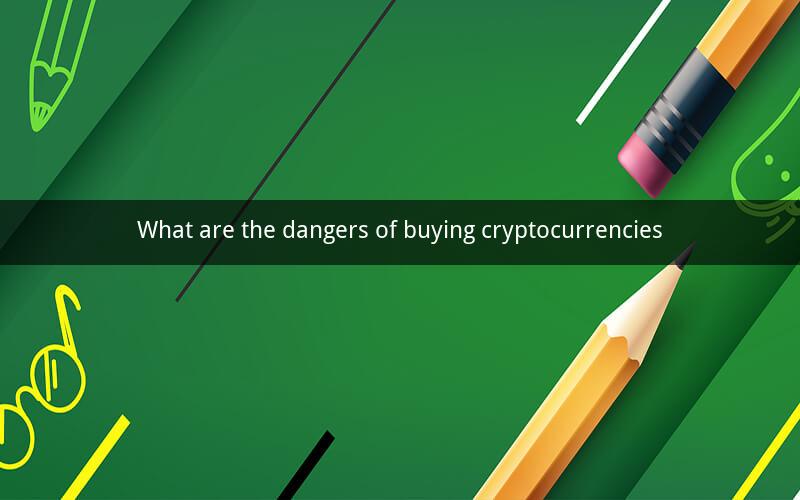
Table of Contents
1. Introduction to Cryptocurrencies
2. The Rise of Cryptocurrencies
3. The Dangers of Buying Cryptocurrencies
3.1 Market Volatility
3.2 Security Risks
3.3 Regulatory Uncertainty
3.4 Scams and Fraud
3.5 Lack of Consumer Protection
3.6 Technological Flaws
4. Conclusion
1. Introduction to Cryptocurrencies
Cryptocurrencies, digital or virtual currencies, have gained significant attention in recent years. They operate independently of a central authority, such as a government or financial institution, and use a decentralized system to record transactions. Bitcoin, the first and most well-known cryptocurrency, was introduced in 2009, and since then, thousands of other cryptocurrencies have emerged.
2. The Rise of Cryptocurrencies
The rise of cryptocurrencies can be attributed to various factors, including technological advancements, increasing distrust in traditional financial systems, and the desire for a decentralized and secure form of currency. Cryptocurrencies have captured the imagination of investors, speculators, and enthusiasts worldwide, leading to a massive increase in their value and popularity.
3. The Dangers of Buying Cryptocurrencies
While cryptocurrencies offer numerous benefits, such as privacy, lower transaction fees, and a decentralized system, they also come with several dangers that investors should be aware of.
3.1 Market Volatility
One of the most significant dangers of buying cryptocurrencies is their extreme market volatility. The value of cryptocurrencies can fluctuate rapidly, leading to significant gains or losses in a short period. This volatility can be attributed to various factors, including regulatory news, technological advancements, and market sentiment. Investors who are not prepared for these fluctuations may suffer substantial losses.
3.2 Security Risks
Cryptocurrencies are stored in digital wallets, which can be vulnerable to hacking and theft. Unlike traditional banks, there is no insurance or guarantee to protect your investments in cryptocurrencies. Moreover, if you lose your private key, you may lose access to your entire cryptocurrency portfolio. Security breaches and thefts have become increasingly common in the cryptocurrency space, and investors must take appropriate measures to protect their assets.
3.3 Regulatory Uncertainty
The regulatory landscape for cryptocurrencies is still evolving, and governments worldwide are grappling with how to regulate this emerging asset class. This regulatory uncertainty can lead to sudden changes in policies, which may impact the value of cryptocurrencies. Investors may face legal and financial risks if they are not aware of the current regulations in their jurisdiction.
3.4 Scams and Fraud
The cryptocurrency market is prone to scams and fraudulent activities. From Ponzi schemes to phishing attacks, investors must be cautious when dealing with cryptocurrency-related projects and exchanges. It is essential to conduct thorough research and due diligence before investing in any cryptocurrency or related service.
3.5 Lack of Consumer Protection
Compared to traditional financial systems, cryptocurrencies offer limited consumer protection. There is no centralized authority to oversee the market, and investors must rely on self-regulatory bodies and community-driven initiatives for support. This lack of protection can leave investors vulnerable to market manipulation, unfair practices, and other risks.
3.6 Technological Flaws
Cryptocurrencies rely on blockchain technology, which is still in its early stages of development. This technology is not without flaws, and vulnerabilities can be exploited by malicious actors. Additionally, the decentralized nature of cryptocurrencies can make it challenging to address these technological flaws, as there is no central entity responsible for maintaining and updating the system.
4. Conclusion
Buying cryptocurrencies can be a risky endeavor, as they come with several dangers that investors should be aware of. Market volatility, security risks, regulatory uncertainty, scams and fraud, lack of consumer protection, and technological flaws are some of the key risks associated with investing in cryptocurrencies. While cryptocurrencies offer numerous benefits, it is crucial for investors to conduct thorough research and exercise caution when entering this market.
Questions and Answers:
1. What is the main risk of investing in cryptocurrencies?
Answer: The main risk of investing in cryptocurrencies is their extreme market volatility, which can lead to significant gains or losses in a short period.
2. How can I protect my cryptocurrency investments from security risks?
Answer: To protect your cryptocurrency investments from security risks, use reputable wallets, enable two-factor authentication, and be cautious of phishing attempts and suspicious activities.
3. What is the difference between a centralized and decentralized cryptocurrency?
Answer: A centralized cryptocurrency is controlled by a central authority, such as a government or financial institution, while a decentralized cryptocurrency operates independently of a central authority, using a decentralized system to record transactions.
4. How can I stay informed about the regulatory landscape for cryptocurrencies?
Answer: Stay informed about the regulatory landscape for cryptocurrencies by following reputable news sources, attending industry conferences, and consulting with legal experts.
5. What are some common scams in the cryptocurrency market?
Answer: Some common scams in the cryptocurrency market include Ponzi schemes, phishing attacks, and fake Initial Coin Offerings (ICOs).
6. How can I conduct due diligence on a cryptocurrency project?
Answer: Conduct due diligence on a cryptocurrency project by researching the team, the technology, the business model, and the market demand for the project's product or service.
7. What is the role of blockchain technology in cryptocurrencies?
Answer: Blockchain technology is the foundation of cryptocurrencies, providing a decentralized and secure system for recording transactions and maintaining a transparent ledger.
8. How can I mitigate the risks associated with market volatility?
Answer: To mitigate the risks associated with market volatility, diversify your cryptocurrency portfolio, set stop-loss orders, and avoid making impulsive decisions based on short-term market movements.
9. What are some technological flaws that can affect cryptocurrencies?
Answer: Some technological flaws that can affect cryptocurrencies include vulnerabilities in the blockchain network, smart contract bugs, and issues with the underlying cryptographic algorithms.
10. How can I stay informed about the latest developments in the cryptocurrency market?
Answer: Stay informed about the latest developments in the cryptocurrency market by following reputable news sources, joining cryptocurrency forums, and attending industry events.